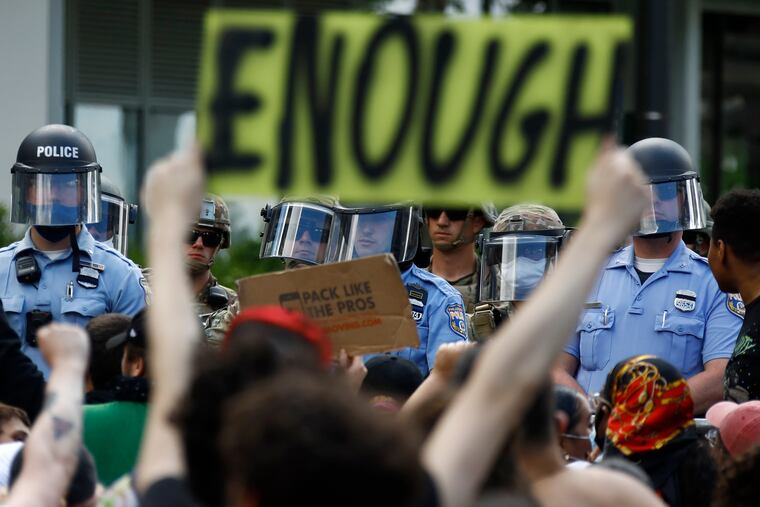The police that Philadelphia deserves | Editorial
This is a moment for Philadelphia to reimagine its police department -- its responsibilities, its tactics, and accountability measures -- as well as who gets a say in shaping its future.

Even though a police officer killed George Floyd more than 1,000 miles away from Philadelphia, the incident hit close to home to many black and brown Philadelphians. A week of protests makes clear that we need a serious rethinking of what we need from police. Small reforms around the edges are not enough. This is a moment for Philadelphia to reimagine its police department -- its responsibilities, tactics, and accountability measures -- as well as who gets a say in shaping its future.
Through the years, there have been many calls for fixing a department troubled with scandals, but its recent history -- of racist social media posts, violent encounters, questionable arrests, and departmental turmoil shows that fault lines remain.
Stop-and-frisk is one telling lens of our policing problems. In 2019, stop-and-frisk continued on a massive scale: nearly 80,000 pedestrian stops and nearly 400,000 vehicle stops. More than 70% of those stopped were black. According to the ACLU of Pennsylvania, in the second half of 2019, about 16% of pedestrian stops and 32% of frisks did not meet the legal standard of reasonable suspicion. It further found 40% of stops were for “quality of life” issues -- open containers, truancy, and being in parks after hours.
Stops rarely remove firearms from the street. That perhaps helps explain why despite so many stops, shootings and homicides continue to increase, with already troubling numbers for this year. About half of those homicides, and most nonfatal shootings, will go unsolved.
Asking less of the police, and giving less
For decades, there have been efforts through training and internal policies to make interactions like stop-and-frisk seem more fair. Those efforts failed. We need to reassess what we are asking police to do.
Police officers are on the front lines of nearly every social ill -- addiction, homelessness, poverty, truancy, just to name a few. Instead of continuing to deploy police in situations that don’t require law enforcement skills, the city should develop and scale up alternative systems. For example, for a year the city has been deploying an alternative response unit in Kensington. The AR-2 unit includes an EMT or paramedic and a behavioral health worker to treat overdoses and connect people with treatment options.
» READ MORE: The Fire Department shows what treating addiction like a disease, not a crime, looks like | Editorial
Alternative systems like AR-2 provide better services and reduce non-law enforcement work from an overburdened police department. They also reduce the chance of situations escalating to police brutality, as happened earlier this year when an officer punched and killed a person recovering from an overdose.
Last year, voters approved a charter amendment to create a new class of officers that will focus on traffic enforcement and other civil infractions. As part of the efforts to fill the estimated $649 million hole in the budget, Philadelphia is planning to delay hiring the safety officers until 2022.
Why not hire these officers, unarmed and without arrest power, to deal with the types of issues that drive 40% of pedestrian stops? That could reduce police workload and increase trust.
» READ MORE: Philly plans to increase police funding while cutting city services. Critics say that’s a mistake.
Mayor Jim Kenney’s budget currently proposes a $14 million increase to the police department’s budget -- and about 20% cuts to the Office of Violence Prevention and the Police Advisory Commission. Kenney says there will likely be “tweaks" to the budget. Those tweaks should include transferring $14 million to the type of alternative systems that improve quality of life, and allow police to focus on serious crimes.
People’s Police Department
A group of black lawmakers and attorneys -- including Philadelphia-area state representatives, four members of City Council, chief defender Keir Bradford-Grey, and local attorneys Kevin Harden Jr. and Kevin Mincey -- published a set of reforms. It is a strong framework that is already making change on the state level: Gov. Tom Wolf announced some of these reforms -- including creating a deputy inspector general within the Pennsylvania Office of State Inspector General to investigate law enforcement agencies and a Pennsylvania State Law Enforcement Advisory Commission, among others.
» READ MORE: Wolf will appoint misconduct watchdog, establish commission to oversee Pa. state troopers, correctional officers
The reforms also include suggestions specific to Philadelphia such as calls to strengthen the advisory commission and increase transparency of internal affairs investigations -- a process currently wrapped in secrecy. There is a lot that Kenney can’t do because of the FOP contract -- which was quietly extended for a year in March -- but there is no excuse to ignore these reforms.
We have arrived at a moment for designing a police department that is smaller, more focused, and subject to democratic accountability ... and one that Philadelphia deserves.